BAT Re-enters the 'AI Search' Battle
![]() 03/14 2025
03/14 2025
![]() 631
631

The battle for AI search has officially commenced.
Traditionally dominant in the search market, Baidu now finds itself encircled by Alibaba and Tencent in the realm of AI search.
On March 13th, Alibaba unveiled its AI flagship app, 'New Quark', igniting a fresh wave of competition in the AI search landscape. According to 'Qu Jie Shang Ye', 'New Quark' leverages Tongyi Qianwen's cutting-edge reasoning and multimodal large model, bidding farewell to traditional search methods and upgrading to an all-in-one 'AI Super Box', catering to users' diverse AI needs across work, study, and life. Future iterations will promptly integrate the latest Tongyi series model advancements.
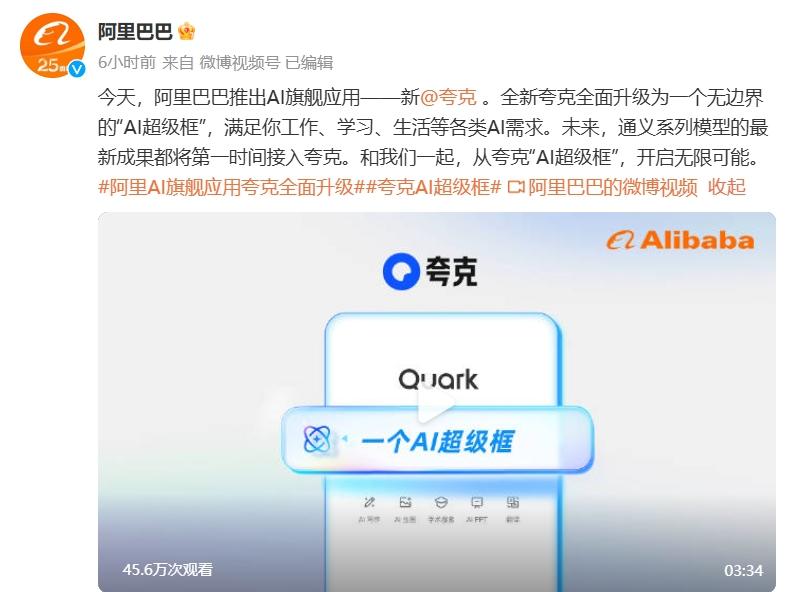
Image Source: Weibo Screenshot
On the other hand, Tencent's 'Tencent Yuanbao' has been even more aggressive; it recently soared to the top of the free app download rankings in China's Apple App Store, outpacing popular apps like DeepSeek and the once-dominant Doubao.
In contrast, despite Baidu's February announcement of major moves, such as making ERNIE Bot 'free' and 'open source', the pace of this AI search competition no longer seems to be solely dictated by Baidu.
Currently, the BAT trio's competition in the field of AI search is intensifying.
01. The 'New Battlefield' for BAT
Alibaba has long harbored ambitions in the vast 'search' market.
As early as 2013, Alibaba launched Shenma Search, aiming to challenge Baidu through the UC Browser's traffic portal. By 2016, He Xiaopeng, then President of Alibaba's UC Mobile Business Group, acknowledged the UC Browser's complexity and revealed plans for a new product. Thus, Quark, embodying Alibaba's hopes for a new generation of search engines, came into existence.
Over the past decade, Alibaba's aspirations in search have remained steadfast, with strategies continuously evolving.
At the end of February, when Quark AI Search introduced its deep thinking feature, it released a product preview on its official Weibo account, directly stating that 'good AI search no longer requires searching' and promising 'no ads' and a 'clean' experience. Almost every post subtly referenced Baidu Search, highlighting its persistent issue with advertisements.
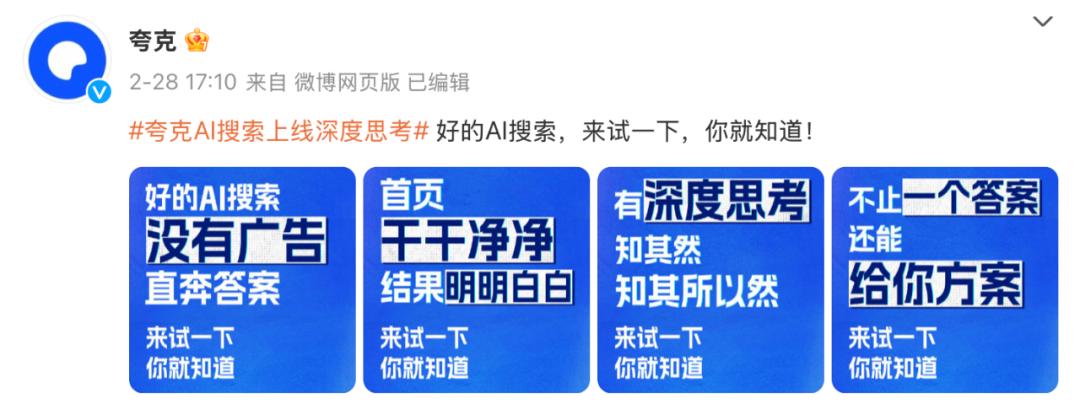
Image Source: Weibo Screenshot
Intriguingly, just days before Quark intensified its search focus, Baidu APP reverted its slogan from 'Baidu it, life is better' to the classic 'Baidu it, you know' from 20 years ago. This adjustment was interpreted by the industry as a sign of Baidu's self-regression and strategic defense amidst the AI search wave.
If Baidu's slogan change aims to stabilize user perceptions with past brand recognition, Alibaba's 'New Quark' seeks to challenge Baidu's foundations with AI search and novel concepts. So, what sets 'New Quark' apart?
According to 'Qu Jie Shang Ye', unlike conventional conversational AI, 'New Quark' integrates AI dialogue, deep thinking, deep search, deep research, and deep execution into a streamlined 'AI Super Box', addressing users' needs in one stop. To some extent, 'New Quark' represents not just a product iteration but Alibaba's determined push in AI search, aiming to upend traditional search engine logic through an 'AI Super Box'. It elevates search from the 'keyword matching + webpage link' model to 'intelligent interaction + one-stop answers', enabling users to access information more efficiently and accurately.
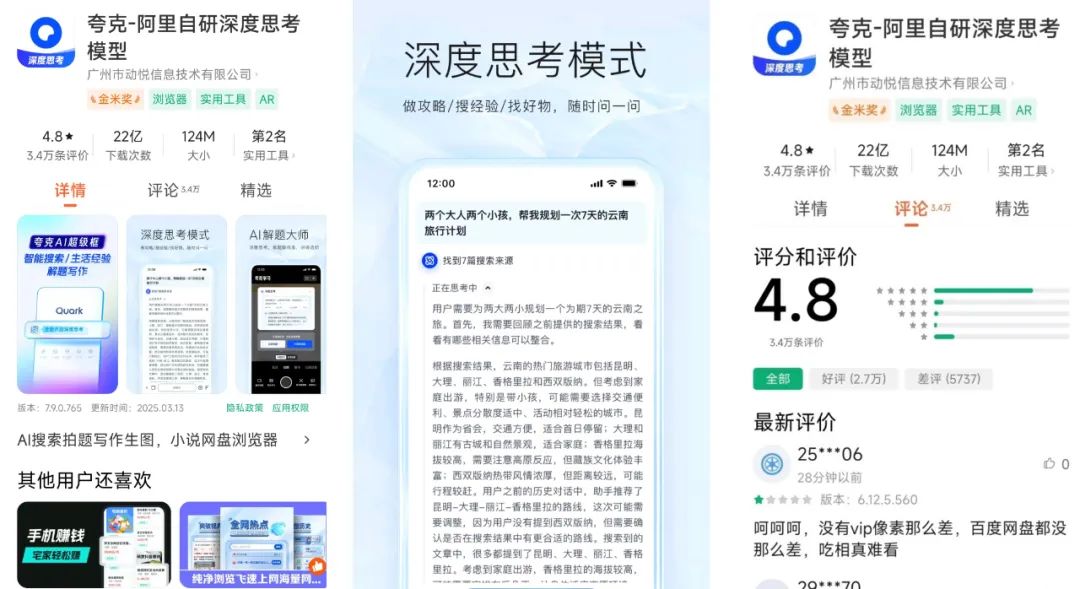
Image Source: Xiaomi App Store Screenshot
In contrast to Alibaba's high-profile 'New Quark' promotion, Tencent's approach to AI search is more direct – 'spending money'. According to AppGrowing platform data, as of February 27th, Tencent Yuanbao spent 281 million yuan on advertising within 27 days, with most ads appearing after February 13th. This means that in just half a month, Tencent Yuanbao's advertising expenditure approached 300 million yuan.
Currently, Yuanbao ads are ubiquitous across Tencent platforms and apps, even within WeChat, which has traditionally been cautious with traffic guidance. This underscores Tencent's emphasis on Yuanbao.
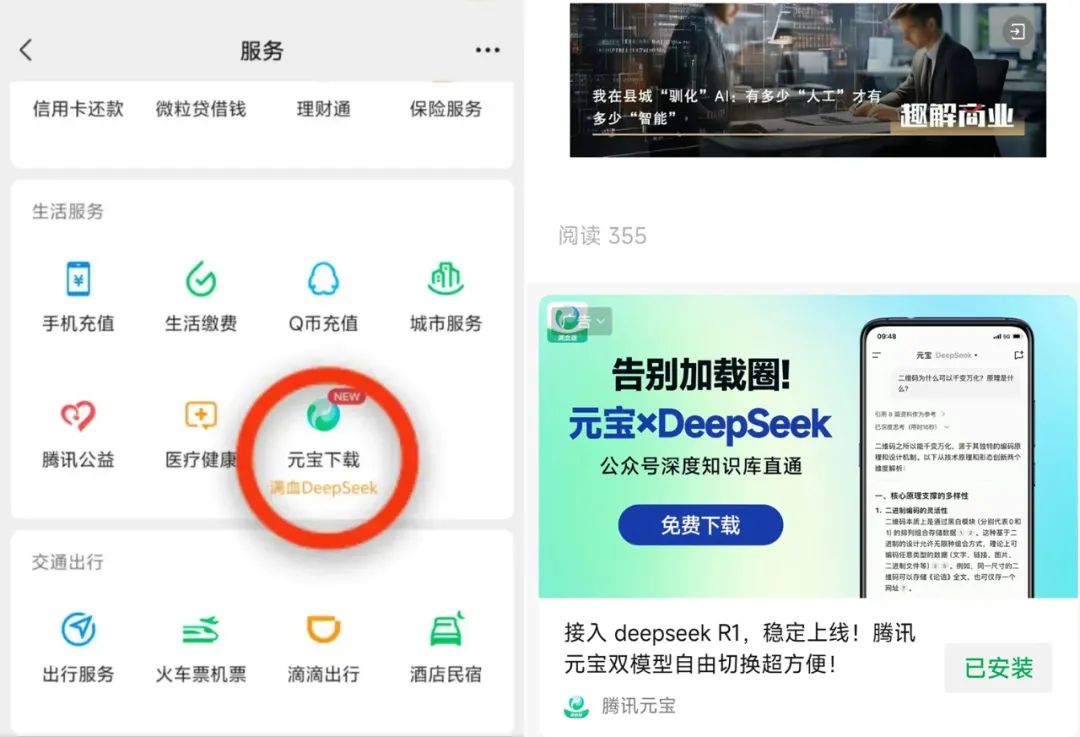
Image Source: WeChat Screenshot
In fact, over the past few years, Tencent has not prioritized search among internet giants. Despite products like WeChat, QQ, and Sogou having search functions, Tencent has never truly captured Baidu's core search business. In the era of AI search, Tencent's sudden investment surge may stem from recognizing AI technology's potential to reshape the search market.
Faced with the rise of Alibaba's Quark and Tencent's Yuanbao, Baidu faces significant challenges. Alibaba's Quark attracts users dissatisfied with Baidu through its 'no ads' strategy, while Tencent's Yuanbao leverages the WeChat ecosystem for seamless user search behavior migration.
02. AI Search: No Clear Winner
As China's long-standing search engine market leader, Baidu's success hinges on its vast user base and mature pay-per-click model. However, in the AI search era, changing user habits and technological disruptions are weakening Baidu Search's dominance.
Besides Alibaba and Tencent, the AI search market includes players like ByteDance, 360, Xiaohongshu, Zhihu, and emerging AI newcomers such as Dark Side of the Moon (Kimi's parent company) and DeepQuest (DeepSeek's parent company), all leveraging AI to redefine search experiences.
However, displacing Baidu is no easy feat. While AI search gradually alters the market landscape, Baidu's technical prowess, data barriers, user habits, and established business models in search make it difficult to dislodge in the short term.
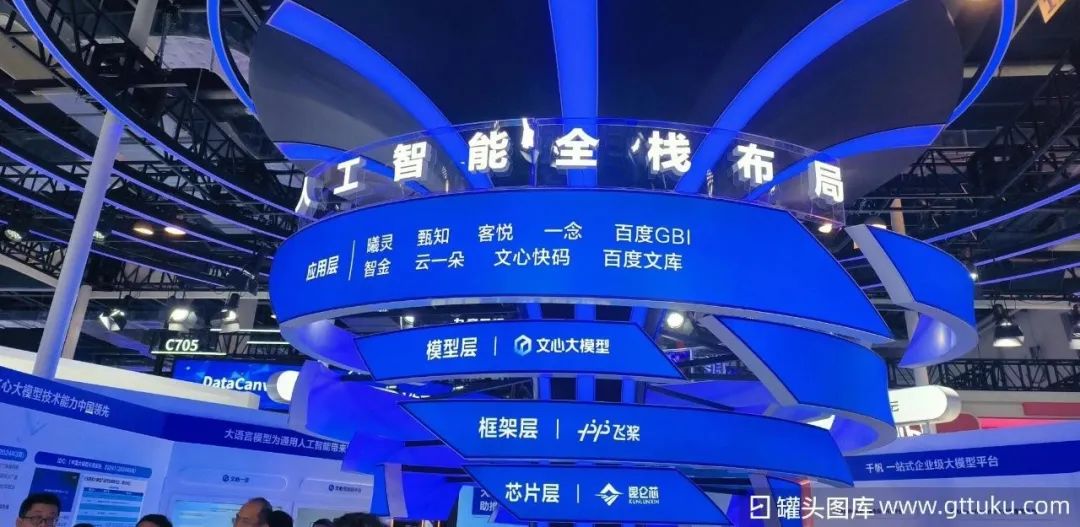
Image Source: CanTouTuKu
Simultaneously, the surging Quark and Yuanbao also face their own issues and limitations, having yet to fully replace Baidu.
Since its 2016 inception, Quark has marketed itself as 'no ads, pure search', aiming to set a benchmark for intelligent search. However, in 2023, Quark was exposed for displaying extensive pornographic information in search results and recommending pornographic and vulgar keywords, violating regulations like the 'Cybersecurity Law'. In response, the Cyberspace Administration of China fined Quark 500,000 yuan and ordered comprehensive rectifications. This incident significantly impacted Quark's brand image and compliance.
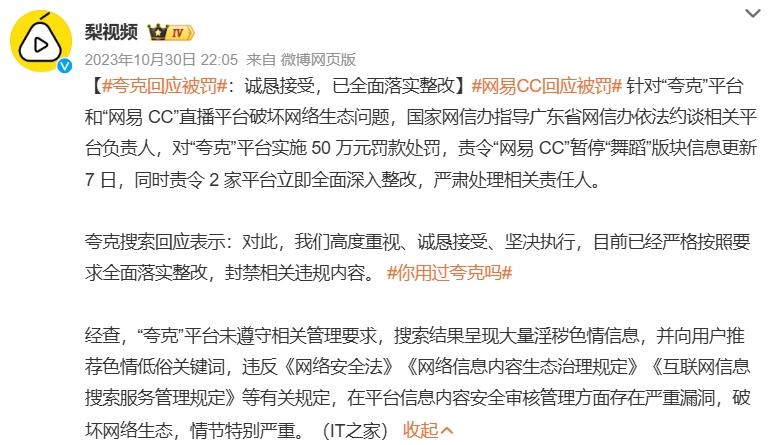
Image Source: Weibo Screenshot
Today, Quark's product matrix is increasingly complex, encompassing AI search, AI writing, smart scanning, health assistant, cloud storage, AI graphic design, among others. Quark's boundaries continue to expand, aiming to become an all-encompassing tool. However, this expansive 'wanting everything' strategy may dilute Quark's focus, confusing some users about whether it's a browser or a multifunctional AI assistant.
Compared to Quark, while Tencent's Yuanbao enjoys a powerful traffic portal, it relies heavily on the Tencent ecosystem, with fragmented search needs. Additionally, Yuanbao primarily offers content retrieval within the Tencent ecosystem, limiting its search experience compared to other products.
While Baidu's search dominance remains hard to shake in the short term, the rise of AI search is unstoppable. For Baidu to stabilize its market share, it must accelerate optimizations. Currently, Baidu has integrated Baidu Search and the ERNIE Bot platform into DeepSeek, enhancing its intelligence. Furthermore, Baidu will release ERNIE Bot 4.5 on March 16th, boasting significantly improved basic model capabilities and native multimodal and deep thinking abilities.
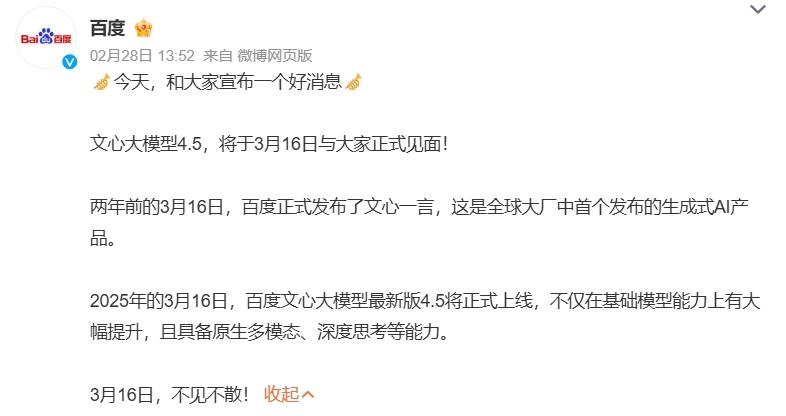
Image Source: Weibo Screenshot
The BAT competition on the new 'AI search' battlefield has reached a critical juncture; it remains uncertain which of these domestic internet giants will emerge victorious in the AI search era.
However, one thing is certain: behind the AI search battle lies not just a technological contest but also a fierce competition for users, traffic, and entry points. AI search is not merely an evolution of search experiences but a microcosm of the internet power structure's reshaping in the AI era.








